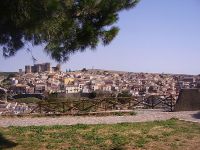Melfi (Lucano: Melfe) is a town and comune in the Vulture area of the province of Potenza, in the Southern Italian region of Basilicata. Geographically, it is midway between Naples and Bari. In 2015 it had a population of 17,768.
History
Early history and Middle Ages
Inhabited by the Daunians and Lucanians, under the Romans, Melfi was included in the area of the colony of Venusia, founded in 291 BC. After the fall of Western Roman Empire, Melfi gained importance in the Middle Ages as a strategic point between areas controlled by the Byzantines and those controlled by the Lombards.
Melfi was captured several times by the struggling powers of the region, until it was assigned to the Norman leader William I of Hauteville. The Hauteville family started from here their conquest of southern Italy, which, in the early 12th century, led to the creation of the Kingdom of Sicily.
In 1059 Melfi became the capital of the Duchy of Apulia. Papal councils were held in the city in the same year and in 1109. In 1231, Emperor Frederick II proclaimed the Constitutions of Melfi (or Constitutiones Augustales) here, reinforcing control over his ever-expanding territory. He created a bureaucracy of paid officials, who among other things imposed a tax system on the local feudal rulers, who resented it but could not resist.
Later, the town shared the fate of the entire Kingdom of Naples, falling into a long period of decline. Under the Angevin crown, Charles II ordered the castle to be renovated and enlarged, making it the official residence of his wife Mary of Hungary.
Modern history
During the war between Francis I of France and Charles V of Spain for the Kingdom of Naples, the French army headed by Odet de Foix sieged Melfi in March 1528, slaying about 3.000 people, without sparing women or children.
Beating the French occupation, Charles V gave to Andrea Doria the title of Prince of Melfi, for having successfully fought
